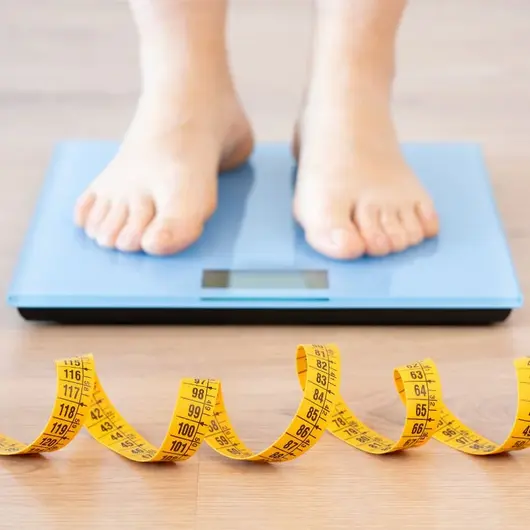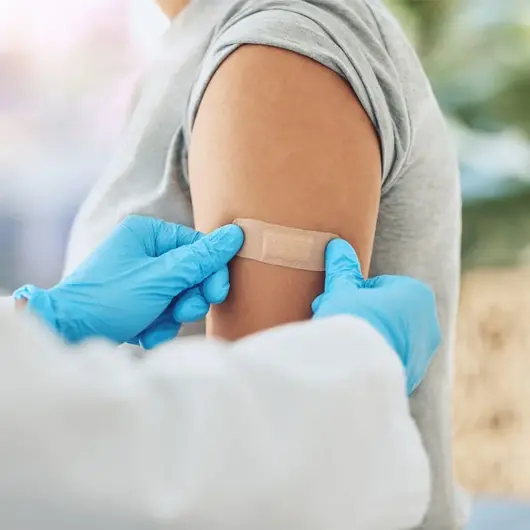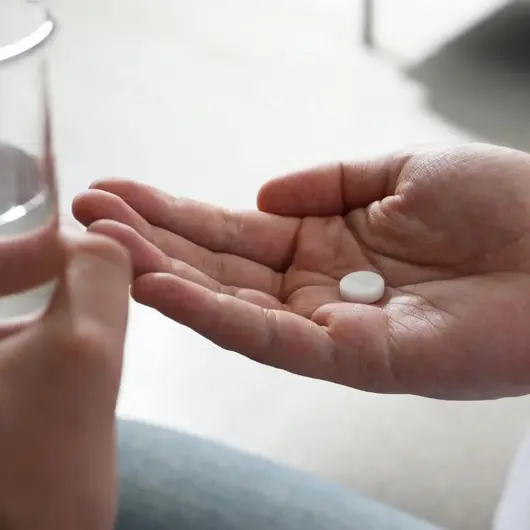Knowing and acting on risk factors
Cancer can have various causes. It is often a combination of factors such as lifestyle, genetic predisposition and environmental influences. Often - depending on age - coincidence also plays a decisive role.
Nevertheless, you can reduce your personal risk of cancer by making targeted changes to your behavior.
Avoid smoking

Smoking is the most important preventable risk factor for cancer, especially lung cancer, but also for numerous other types of cancer such as bladder, kidney, oral cavity and laryngeal cancer. Overall, smoking causes around 20 percent (85,000) of all new cases of cancer in Germany (as of 2018). Quitting smoking or avoiding passive smoking significantly reduces your risk. The sooner you stop smoking, the better - but quitting smoking is worthwhile at any time, as it has a noticeable positive effect on your health after just a short time. And if you have never smoked: Stick with it, as this will protect you in the long term.
Abstain from alcohol

Alcohol is also a risk factor for various types of cancer, including liver, breast, mouth, throat and oesophageal cancer as well as stomach, colon and rectal cancer. Every year, around 22,000 new cases of cancer in Germany are attributable to alcohol consumption (as of 2020). Even small amounts of alcohol increase your risk of cancer. It is therefore advisable to limit your consumption or, ideally, to avoid it altogether.
Eat healthily

In 2018, around 35,000 cases of cancer were attributable to an unhealthy diet. An unhealthy diet can increase your risk of cancer. However, a balanced diet with plenty of fruit, vegetables, pulses and wholegrain products as well as little red meat and as little processed meat as possible will help to reduce your risk. Processed meat, such as ham, bacon, salami and sausage, is associated with an increased risk of bowel cancer. It is also recommended to reduce the consumption of high-calorie foods such as soft drinks, sweets and fried foods, as they can contribute to weight gain due to their high energy density.
Avoid overweight

Being very overweight increases the risk of various types of cancer, including breast, bowel, kidney and pancreatic cancer. The risk of cancers such as endometrial and liver cancer is also increased with obesity. Around 30,000 cases of cancer - or around 6% of all new cases - are attributable to obesity (as of 2018). A healthy diet and regular exercise can keep your weight within the normal range and thus reduce your risk of cancer.
Integrate exercise into your daily routine

Exercise has positive effects on various processes in the body that counteract the development of cancer, such as the regulation of inflammatory processes, the immune system and hormone balance. If you spend less time sitting and exercise regularly, you reduce your risk of various types of cancer such as bowel, breast and uterine cancer. Just 30 minutes of physical activity a day, such as walking, cycling or light sports, will improve your health and prevent obesity.
Counteract pathogens

Viruses such as certain types of human papillomavirus (HPV) or the hepatitis B and C viruses, but also other pathogens, are causally involved in the development of some types of cancer. For example, HPV causes cervical cancer and a number of other types of cancer, while hepatitis viruses are associated with liver cancer. Vaccinations, for example against HPV or hepatitis B, offer effective protection.
Reduce harmful environmental influences

Pollutants from the environment can affect health. Some of these substances, such as asbestos or certain pollutants in the air or in the workplace, can increase the risk of cancer. Protective measures in the workplace and in everyday life reduce exposure and help to reduce risks.
Radioactive radon can also enter the lungs via the air we breathe and cause lung cancer. After smoking, it is the second most important risk factor for this type of cancer. Radon is a naturally occurring gas that is found everywhere in varying concentrations. It escapes from the ground into the air and can accumulate in enclosed spaces, especially in lower floors or basements. Find out about the radiation exposure in your home and, if necessary, take measures to reduce radon levels.
Further information can be found on the page of the Federal Office for Radiation Protection.
Avoid UV radiation

Natural UV radiation from the sun as well as artificial UV radiation in tanning beds or at the workplace increase the risk of skin cancer, both white and black skin cancer. Protect your skin by avoiding intense sunlight, especially at midday, staying in the shade, covering your body with textiles, using sunscreen on all uncovered parts of your body and avoiding tanning beds.
Only use medication in a very targeted manner

Some medications, such as hormone replacement therapies and immunosuppressants, can increase the risk of cancer. Talk to your doctor about the benefits and risks, especially if you are taking them long-term.
For mothers: Breastfeed your baby

If possible, breastfeed your child. Breastfeeding can reduce the mother's risk of breast cancer. The longer you breastfeed your child, the better. The protective effect of breastfeeding has not yet been fully researched, but it is thought to be related to changes in breast structure and reduced lifelong hormone exposure in the mother's body.
Further information can be found on the website of the International Agency for Research on Cancer.
Clarify familial cancer risk at an early stage

Some cancers can be caused by genetic factors. If certain types of cancer are more common in your family, you should find out about genetic counseling and testing. This applies in particular to breast, ovarian and bowel cancer. Regular check-ups can help to detect cancer at an early stage.
